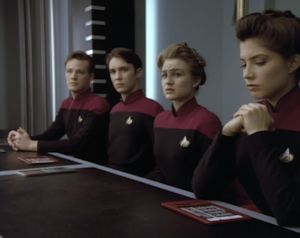| |||||||||||
| |||||||||||
|
Spoiler-free notes: Am I the only one who wants to hear Captain Picard's commencement address? I was initially confused why Lieutenant Commander Albert, Joshua's father, is frequently called just "Commander Albert," so I did some digging and discovered that it is wholly appropriate in modern military parlance to shorten "Lieutenant Commander" to "Commander." It's odd that, even though this episode is about Wesley, we don't actually see him until the 7 minute mark. In actuality, though, this episode is told mostly from Picard's point of view. The way they use Boothby in this episode is simple, but ingenious. It's rare to see Picard looking up to somebody else, but they needed somebody to parallel Picard's father-figure connection to Wesley. Boothby, who is mentioned in earlier episodes, fits the bill perfectly, and it's good they cast Ray Walston--somebody with a decent amount of warmth and acting gravitas--to play opposite Patrick Stewart. The story needs to remind us that Picard is capable of understanding exactly what Wesley is going through, so that he doesn't come across as cold when he finally confronts the kid. There's added dramatic irony in that, by talking with Picard about the time he had to push him to do what was right, Boothby is again pushing him to do what he needs to do. There is some really tight, subtle writing going on here. Obvious discrepancies in the story Locarno's team is telling at the first hearing are successfully diffused by Locarno when he makes the admission that Josh had been flying erratically and that he hadn't brought it to anyone's attention. We, as the audience, might be able to see through this, but it is clever in that it is completely airtight. Locarno's version of events explains everything thus far, admits guilt to lend it extra credibility, and as an extra twist, gives something to make Wesley feel incredibly guilty about. The writers were very careful in thinking through the plot. In retrospect, maybe Nova Squadron shouldn't have named themselves after an explosion in space. The scene where Josh's dad apologizes to Wesley because he thinks the accident was Josh's fault is painful to watch. Wesley's guilt is palpable. This episode is, without question, my favorite Wesley-centric one, a culmination of his entire character arc. Because Wesley is now a recurring guest star instead of a regular, his fate is totally in the air, and as the audience is made aware of what is at stake, it is far from certain that Wesley will pull through with his budding Starfleet career intact. Since Wesley's path as a character has been extremely linear and predictable up until this point, this story is putting his defining characteristics on trial, in effect showing a Wesley who is potentially very different from the character we've grown to expect. Wesley, before now, is a completely moral wunderkind who can do no wrong, but here, he is caught doing something immoral, wrong, and terribly consequential. His guilt, therefore, is a lot more meaningful and real than the guilt he shows in earlier episodes (such as "Evolution," in which he is responsible for unleashing nanites on the Enterprise). It helps that the specifics of what he did is left ambiguous until the climactic confrontation with Picard, that the episode is structured like one of TNG's puzzle shows instead of being formulated as a more standard drama. Even though the sci-fi is again taking a backseat to character development, the show still retains all the DNA of TNG's best sci-fi episodes, still tells its story in a uniquely Trek fashion. For all of these reasons, the long scene where Picard finally exposes Wesley's lie and challenges him to correct it is weighty and intense. Picard is genuinely disappointed in Wesley, but he also completely understands. He wants Wesley to survive this and do the right thing, but he also doesn't want to destroy their relationship. Therefore, you can look at this episode from two very different perspectives: you can look at it as Wesley learning what it means to be a Starfleet officer as he weighs his loyalty to the truth with his loyalty to his friends--something any young adult can relate to--or you can look at is as Picard learning how to act as a parent, even though, technically, Picard is not one. This is a deeply emotional episode, and a powerful one at that, a high point for the season thus far. Robert Duncan McNeill, the actor who plays Nicholas Locarno, will go on to play Tom Paris in VOY. In the conceptual stage of VOY's production, Paris was inspired by Locarno, but McNeill wasn't initially considered for the role. When he got it, they chose not to make Paris Locarno for a couple of reasons: one was monetary--the showrunners didn't want to pay royalties to the writer of "The First Duty" for every episode of VOY--and one was that the writers felt Locarno was irredeemable. I think it's a lost opportunity, though, because I don't believe for a second that Locarno is irredeemable and I think he would have been far more interesting coming to a new show with the baggage of this episode than Paris ultimately winds up being. It also would have lent VOY a more genuine moral ambiguity, something the show strives--but fails--to have. When he sees Picard for the first time, Boothby asks "What happened to your hair?" Indeed, in "Tapestry," we see a young Picard with hair. However, in Star Trek: Nemesis, we see a picture of a young, bald Picard and Shinzon, Picard's clone, is also bald. Sito Jaxa is eventually assigned to the Enterprise and appears in the episode "Lower Decks," where her relationship to Picard is a quasi-continuation of Picard's relationship to Wesley in this episode. | |||||||||||
|
| |||||||||||
| |||||||||||
|
Copyright ©2012 e. magill. All rights reserved.
|

